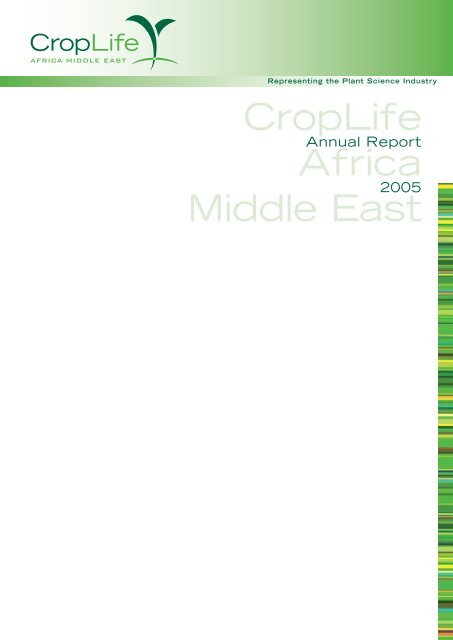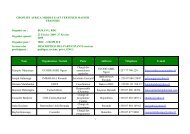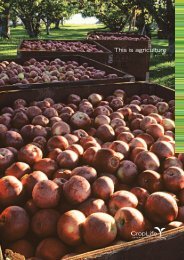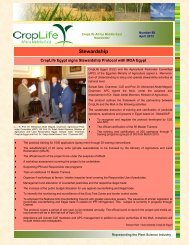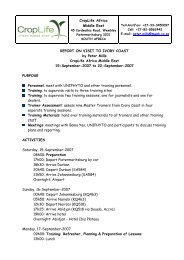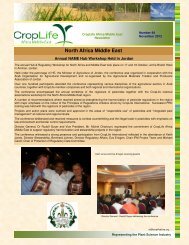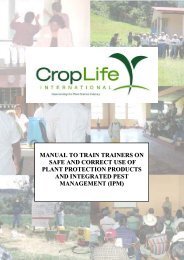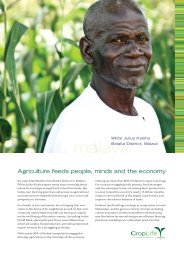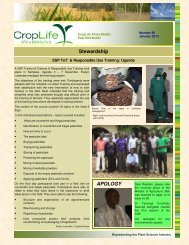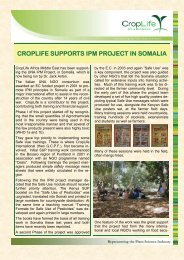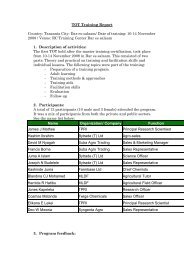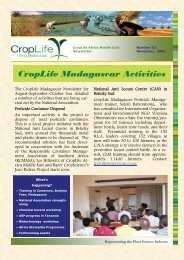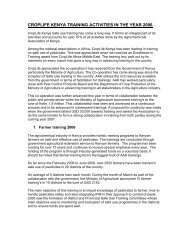Annual Report 2005 - CropLife Africa Middle East
Annual Report 2005 - CropLife Africa Middle East
Annual Report 2005 - CropLife Africa Middle East
You also want an ePaper? Increase the reach of your titles
YUMPU automatically turns print PDFs into web optimized ePapers that Google loves.
AFRICA MIDDLE EASTRepresenting the Plant Science Industry<strong>CropLife</strong><strong>Annual</strong> <strong>Report</strong><strong>Africa</strong><strong>2005</strong><strong>Middle</strong> <strong>East</strong>
<strong>CropLife</strong> <strong>Africa</strong> <strong>Middle</strong> <strong>East</strong><strong>Annual</strong> <strong>Report</strong> <strong>2005</strong>The <strong>2005</strong> <strong>Annual</strong> <strong>Report</strong> has been prepared by the Regional Coordinator with inputs fromArea Coordinators and the Training Consultant and edited by the President of the Organization.IntroductionThis third <strong>Annual</strong> <strong>Report</strong> of <strong>CropLife</strong> <strong>Africa</strong> <strong>Middle</strong> <strong>East</strong>covers the period of the financial year from 1 st January to31 st December <strong>2005</strong>. The General Assembly of the organizationheld its annual meeting on June 1 st in Brussels. In additionto the statutory decisions and approvals, the GeneralAssembly also elected Mr. Peter van den Hoek, representingBASF in the Assembly as an additional director of theExecutive Committee by a unanimous vote.The Executive Committee held three meetings in <strong>2005</strong>. Thefirst meeting in Rome in February <strong>2005</strong> was combined witha visit and discussions at the FAO. The June meeting wascombined with the AGM and the <strong>Annual</strong> Conference of<strong>CropLife</strong> International in Brussels and the Septembermeeting followed the hub meeting for North <strong>Africa</strong> <strong>Middle</strong><strong>East</strong> in Casablanca. These meetings focused on the executionof hub action plans and the periodical review andmonitoring of budget performance.Three annual hub meetings were also convened during theyear, April in Cotonou, June in Lusaka and September inCasablanca with the objective to provide guidance andcoaching to national association activities together with supportof regional regulatory initiatives.All activities of <strong>CropLife</strong> <strong>Africa</strong> <strong>Middle</strong> <strong>East</strong> during <strong>2005</strong> werecarried out in line with the priorities set by the association andthe action plans approved by the Executive Committee. Thisreport elaborates on the various areas of activity.Regulatory HarmonizationNorth <strong>Africa</strong> <strong>Middle</strong> <strong>East</strong>• The regulatory harmonization initiative, co-driven by Crop-Life <strong>Africa</strong> <strong>Middle</strong> <strong>East</strong> and the Arab Organization forAgricultural Development (AOAD) continued to expandthe harmonization of regulatory measures amongst countriesof the sub-region.• The approved harmonized application form has beenaccepted and implemented in 16 out of the 18 membercountries with the exception of Qatar and Oman who arestill pending issuance of national legislation on theregistration of pesticides.• A fallback in implementing the harmonized form in Libya isbeing addressed through the AOAD. In Egypt, the “metoo”registration system which was introduced in 2003has been cancelled by the new government.• In Morocco, implementation of the harmonized form led toan increase in quality of submissions and a reduction in thenumber of requests for registrations. In <strong>2005</strong> the numberof rejections was 17% compared to 60% in 2003.• Iraq has been reinstated as a member of the regulatoryinitiative. Two delegates of the Iraqi regulatory authorityattended the annual regulatory meeting in Casablanca inSeptember <strong>2005</strong> and accepted to introduce the harmonizedform and documents in their country.• Content and format of a harmonized label proposal hasbeen accepted by member countries.• All member countries accepted the issuing of a registrationcertificate for each product. Tunisia would issue certificatesonly upon request. The content and format of aproposed registration certificate has been accepted withcertain freedom for modifications in the case of Jordan.• AOAD agreed to establish a data base on pesticides usesto trigger exchange of field data.West and Central <strong>Africa</strong>• The terms of reference for the regional regulatory harmonizationon crop protection products in West <strong>Africa</strong> havebeen approved and the study is underway for a workableregional framework. Both ECOWAS and WEAMU are fullyinvolved and are leading the process. A regional workshopwill be organised by mid-2006 to validate the harmonizationframework for the sub-region.• The initiative for a Central <strong>Africa</strong> Phytosanitary Committee(CPAC) has been signed by the Ministers in charge ofAgriculture in the individual CEMAC countries. The initiativehas been submitted to the Council of Ministers of CE-MAC for adoption prior to implementation.• Liaison at country level was undertaken with the registrationauthorities through workshops and seminars topromote the need for effective application of regulations.These activities were conducted in Ghana, Mali andBurkina Faso. The impact of fraud and counterfeitproducts on the economy were stressed; authorities werethus requested to implement corrective measures tocombat these practices, and to support effectivemanagement of CPPS in the different countries.<strong>East</strong> and Southern <strong>Africa</strong>The <strong>2005</strong> SEARCH meeting in Lusaka focused on developinga guideline on “Mutual Data Acceptance”. Implementationof this across the fourteen countries of SEARCH provedto be extremely difficult leading to the direction of “countrygroupings” which will be developed further during 2006.Additional achievements arising from the Lusaka meetingwere:• The Guideline for the Registration of Generic Productswas accepted as the minimum requirement for thegranting of a generic product registration.• The Guidelines for the Repacking and Small Pack Requirementswas accepted and will be implemented.
Regional CoordinatorArea CoordinatorArea CoordinatorSafe Use Trainerand Area Coordinatorfor West and Central <strong>Africa</strong>:for <strong>East</strong> and South <strong>Africa</strong>:<strong>CropLife</strong> <strong>Africa</strong> <strong>Middle</strong> <strong>East</strong>for North <strong>Africa</strong> <strong>Middle</strong> <strong>East</strong>:Yao Bama OctaveLes HillowitzPeter MillsAli Mohamed Alibased in Abidjan,based in Johannesburg,based in Pietermaritzburg,based in Amman, JordanCôte d’IvoireSouth <strong>Africa</strong>South <strong>Africa</strong>• Agreement to identify the major crops within SEARCH or“country groupings” in order to develop harmonized trialprotocols and corresponding MRL’s.<strong>CropLife</strong> represented the SADC Secretariat at the UNITAR“Global Thematic Workshop on Strengthening Capacities toImplement the Global Harmonized System of Classificationand Labeling of Chemicals (GHS)”.In 2003 <strong>CropLife</strong> assisted the SADC Secretariat in developinga framework for an “MRL Project” which they thenpresented to the EU for funding. Towards the end of <strong>2005</strong> abudget for the project was approved. We learned that theEU consultant in charge of the project appraisal included inhis findings that <strong>CropLife</strong> (SEARCH) must be a partner in theproject for this to be a success.Training and StewardshipNorth <strong>Africa</strong> <strong>Middle</strong> <strong>East</strong>• In line with the Executive Committee policy to support localcapacity building on Safe Use/IPM training activities, threemaster trainer courses were organized in Egypt, Sudanand Jordan. In total 41 master trainers were certified.• Financial assistance to national associations was directedstrictly to support stewardship and training activities asdecided by the hub chair and regional coordinator.West and Central <strong>Africa</strong>• Primarily farmers and retailers were targeted in allcountries. About 5000 farmers benefited from training andstewardship activities conducted by member companiesof national associations of the <strong>CropLife</strong> network. 400distributors and retailers were trained during sessionsconducted by the national associations.<strong>East</strong> and Southern <strong>Africa</strong>• During <strong>2005</strong> the drive towards capacity building continuedwith the focus on “Training of Trainers”. Five suchtrainings were undertaken within the region and for thefirst time a follow-up assessment of trainers was carriedout in a country, in this instance, Ethiopia. For the countriesparticipating in the <strong>Africa</strong> Stockpiles Program our endeavorwas to include key personnel in the training program.• In the area of “container management” and together withthe Plastics Federation of South <strong>Africa</strong> the initiative“Plastics on the Farm” was developed. This initiative commencedin the well known agricultural area of the WesternCape and involves the collection of all obsolete plastics onthe farm which are then taken to an accredited recycler.A second initiative is in the development phase and involvesthe production of “ecowood” of which the mainconstituent is obsolete plastics. This project is likely toreceive funding from the EU. In South <strong>Africa</strong>, the AreaCoordinator will participate in the working group that theDepartment of Agriculture has created for containermanagement.• One of the highlights in <strong>2005</strong> was that a MoU withFANRPAN was signed. The Food, Agriculture and NaturalResources Policy Analysis Network (FANRPAN) is anautonomous stakeholder-driven policy research, analysisand implementation network that was established in1997. FANRPAN is represented in 11 SADC countries.The main objectives of FANRPAN are to promote appropriateagricultural policies in order to reduce poverty, increasefood security and promote sustainable agriculturaldevelopment in the SADC region. Within the projectportfolio of the organization two projects were identifiedin which we saw the opportunity for a partnership. Theseare:• “Contract Farming” as a mechanism for the commercializationof smallholder agriculture in the SADC region.• Addressing agricultural biotechnology policy issues toimprove food security in the SADC region.With the above as background a MoU was signed betweenthe parties which outlines the partnership coveringthe promotion and facilitation of:• “Safe use initiatives”.• Regional harmonization efforts of biosafety regulationsfor the registration and regional commercialization ofgenetically modified organisms (GMO’s).An action plan has been developed which will be rolled outduring 2006.Regional Training Overviewprovided by Peter MillsIn terms of training, the overall objective is the creation of suitablytrained Master Trainers through <strong>CropLife</strong> <strong>Africa</strong> <strong>Middle</strong><strong>East</strong>'s program of capacity building throughout the region, at alllevels and in all sectors. In addition, the secondary objective tothis is the cascading of training down throughout all sectors.We are continuing the project which began in 2002. It started witha Training Needs Analysis (Phase I), where 34 country visits weremade and personnel from the Industry National Associations,NGO's, Training Institutions and other stakeholders were consultedon the requirements. As a result of this TNA, a Pilot Project(Phase II) was introduced in Zimbabwe, where the first Training ofTrainers course was presented. Initially this was a three x five daycourse. After consultations on Industry requirements and budgetarydiscussions, this was eventually compacted into an intensivefive day course, and the first in the on-going program (Phase III)was conducted in Amman, Jordan for Industry trainers comingfrom countries throughout the North <strong>Africa</strong> <strong>Middle</strong> <strong>East</strong> region.
Subsequently, another 11 courses were conducted in 2004, 15 in<strong>2005</strong>, and another 15 are planned for 2006 (all part of Phase III).Phase IV of the program is the training of others, by these“Master Trainers”, and this has been a continuing program. PhaseV is the assessment of the Master Trainers, and this has begun inEthiopia and Ghana, with the assistance of Belgian TechnicalCooperation and IFDC, respectively. Partnerships have been formedin several countries, including: IFDC (Malawi, Ghana); USAID(Uganda); FAO (Tanzania, Ethiopia, SA); Belgian Technical Cooperation(Ethiopia). The last part of the program, Phase VI, is theassessment of the trained trainees in each country. This ImpactAssessment will be a massive and costly task, which will requirepre- and post-training surveys, and is being planned for the future.Future plans are linking with other education/training institutions,and providing post-graduate students with the necessary skills,materials and information to use when they enter the industry orgovernment. The first one is planned for the MediterraneanAgronomy Institute in Bari, Italy, which caters for students fromthroughout the Mediterranean region.To date the program has trained over 400 Master Trainers. It isestimated that approximately 30000 farmers, retailers, and otherparticipants have been trained in <strong>2005</strong> by these Master Trainers.In addition, two French speaking Facilitators, funded by IFDC,have begun a Training of Trainers program in West and North<strong>Africa</strong>. A program of introducing Arabic speaking Facilitatorsbegins in 2006. The plan is to have several Facilitators in each ofthe three regions, <strong>East</strong>-Southern, West-Central and <strong>Middle</strong>-<strong>East</strong>-North <strong>Africa</strong>, each conducting Train-the-Trainer courses in locallanguages, thereby building capacity throughout the region.In <strong>2005</strong>, Training of Trainers courses to create Master Trainerstook place in Malawi (with 10 participants from Malawi, 3 fromSouth <strong>Africa</strong> and 3 from Namibia); Egypt (17 participants, someof whom are now doing training for the USAID backed AgricultureReconstruction and Development Program for Iraq - ARDI);Sudan (15 participants from government); Cote d’Ivoire (8 participantsfrom government and industry, including the NationalAssociation Chairman!); Mauritius (12 very high caliber participants);Cameroon (10 English speaking participants); Ethiopia(12 participants); Tanzania (13); Zambia (15); Mali (the firstFrench speaking course for 11 participants, run by <strong>CropLife</strong>trained IFDC facilitators); Sudan (12); Jordan (6 participantsfrom Palestine and 5 from Jordan); Senegal (the second Frenchspeaking course, for 12 participants, again facilitated by theIFDC facilitators); Ghana (the <strong>CropLife</strong> trained IFDC facilitatorsran their own Training of Trainers course for 14 participantsrepresenting pesticide dealers);Refresher courses for the Master Trainers were also conductedin Ghana (8); Cameroon (2 Master Trainers attended the secondMaster Trainer course as a refresher); Ethiopia (8 participants);Sudan (12 participants).In addition, there were several opportunities for the <strong>CropLife</strong>Training Consultant, Peter Mills, to assess the Facilitators andMaster Trainers (Ghana, Senegal, Ethiopia, Mali), which formspart of Phase V of the Capacity Building program.A Train-the-Trainer Manual has been compiled for the mainfacilitators, including Peter Mills, two French speaking facilitatorsand Arabic speaking facilitator. These have all been translatedinto French and are currently being translated into Arabic. A manualfor dealers was compiled for the Ghanaian pesticide dealersassociation, GAIDA. Other training manuals on General SafeUse, Storekeeping, Transporting, Maintenance & Calibration ofSprayers, Disposal, Scouting, Protection of the Environment,Poisoning. These are made available only to the Master Trainersfor use in compiling their own training courses for their own circumstances.Other materials made available to the trained MasterTrainers include manuals from other regions, notably thetranslated manuals from <strong>CropLife</strong> Latin America; all picturesfrom the <strong>CropLife</strong> guidelines; posters from the terminated SafeUse Program in Kenya; training course materials from the discontinuedAsia Pacific Regional Technology Center’s AgLearncourses.New this year is the Newsletter, the first edition published inNovember, <strong>2005</strong>, which is now available on the web site.Additional Newsletters will be published quarterly.Another success is the <strong>CropLife</strong> Egypt Dealer Accreditationscheme, which is run by <strong>CropLife</strong> Egypt in conjunction with thegovernment and the local seed association.Future training will continue the program of creating more MasterTrainers throughout the region, as well as assessing these MasterTrainers in the work environment. Focus will also be given toforming more partnerships to assist with the cascading of trainingto dealers and farmers. A new initiative will be the focus onthe FAO’s Code of Conduct, including setting up training programsfor its implementation.Obsolete stocksNorth <strong>Africa</strong> <strong>Middle</strong> <strong>East</strong>With the launch of Phase (1) of the <strong>Africa</strong> Stockpiles Program(ASP), two of the hub countries namely Tunisia andMorocco are lined up for activities targeting the clean-up ofobsolete pesticide stocks, they are amongst the sevencountries of the Phase (1) initiative.The Global obstocks Team of <strong>CropLife</strong> International shouldersthe provision of technical support in ancillary activitiessuch as safeguarding of stocks and related training requirements.
West and Central <strong>Africa</strong>A national information and sensitization campaign on theASP was conducted in Mali by the country project teamwith the contribution of <strong>CropLife</strong> Mali prior to the inventoryprocess commencing.The contribution of <strong>CropLife</strong> International for disposal activitiesand that of <strong>CropLife</strong> <strong>Africa</strong> <strong>Middle</strong> <strong>East</strong> for preventionmeasures were highlighted during a briefing conferenceto journalists organised by WWF and Pan-<strong>Africa</strong> inBamako, Mali.<strong>East</strong> and Southern <strong>Africa</strong>At the end of <strong>2005</strong> the <strong>Africa</strong>n Stockpiles Program wassigned off by the World Bank Board and country Grant Aidagreements should now start in the early stages of 2006.Within the <strong>East</strong> & Southern <strong>Africa</strong> region these countries includeEthiopia, Tanzania and South <strong>Africa</strong>. In South <strong>Africa</strong>we have been asked to lead the inventory process for theprivate sector within the project.Agricultural BiotechnologyNorth <strong>Africa</strong> <strong>Middle</strong> <strong>East</strong>• While the importation and introduction of GMO’s are stillprohibited in nearly all of the hub countries, GMO’s remainunder the responsibility of seed departments and geneticalengineering research institutes.• The Genetical Engineering Research Institute (AGERI) inEgypt has been identified as a reference institution onGMO’s for <strong>Middle</strong> <strong>East</strong> and North <strong>Africa</strong>n countries.• Emphasis on this area is in developing the appropriatelegislations and biosafety protocols.West and Central <strong>Africa</strong>• Participation at the ECOWAS <strong>Annual</strong> Ministerial Conferencein Bamako, Mali provided the opportunity to renewcontacts with other stakeholders such as the BurkinaBiotech. Association (BBA), the Forum for AgriculturalResearch in <strong>Africa</strong> (FARA) and (WECARD).• <strong>CropLife</strong> Cameroon has joined the Cameroon BiotechnologyCommittee for the sensitization and information of thepublic on biotechnology issues in the country.<strong>East</strong> and Southern <strong>Africa</strong>• Our drive to develop informed communicators in the fieldof biotechnology continued during the year. This led to afollow-up training during the third quarter organized inconjunction with <strong>Africa</strong>Bio. Representatives of NationalAssociations from the following countries participated inthe training: Kenya, Mauritius, South <strong>Africa</strong>, Zimbabwe,Zambia and Uganda.Alliances and PartnershipsNorth <strong>Africa</strong> <strong>Middle</strong> <strong>East</strong>1. AOADAn updated Memorandum of Understanding has beensigned between <strong>CropLife</strong> <strong>Africa</strong> <strong>Middle</strong> <strong>East</strong> and the ArabOrganization for Agricultural Development aimed at expandingmutual cooperation towards joint regional trainingactivities while still supporting the regional regulatory harmonizationinitiative in the sub-region.2. CIHEAMJoint activities with the Mediterranean Agronomic Instituteof Bari (CIHEAM) continued towards support of IPM projectsin Mediterranean countries through exchange of informationand expertise. In this context Dr. Anna MariaD’Onghia of CIHEAM participated at the annual hub meetingin Casablanca, Morocco in September <strong>2005</strong> for thesecond time. Agreements were reached on mutual trainingactivities between the two organizations focused on SafeUse/IPM.3. FAOMutual exchange with the FAO has been established withthe focus on measurement and improvement of complianceto the FAO Code of Conduct. Cooperation in this directionis being maintained with the FAO Near <strong>East</strong> officein Cairo.4. IFDCMutual discussions with the IFDC resulted in agreementwith that organization to extend training facilitation inNorth <strong>Africa</strong>n countries besides WCA. Two master trainingsessions have been scheduled to take place inMorocco and Tunisia within this cooperation framework.West and Central <strong>Africa</strong>Activities related to the MoU with the IFDC covered regulatoryissues on crop protection products and seeds in West<strong>Africa</strong>, capacity building and strengthening of national associations.Two “training of trainers” sessions on IPM/SU wereconducted in French in Senegal and Mali. Another area ofcooperation was communication and information exchange.Common activities were regularly reported in local and/or internationalmedia such as “Afrique Agriculture”. This collaborationled to the co-organisation of the annual hub workshopallowing for the participation of more stakeholders.Collaboration was initiated with other organizations and institutionsimplicated in the use, management of and policies onCPPs. WWF, Pan-<strong>Africa</strong>, IFAD and Winrock are about to concludeformal cooperation with the national associations.
<strong>East</strong> and Southern <strong>Africa</strong>During <strong>2005</strong> a draft Memorandum of Understanding was developedwith COMESA, this has yet to be signed. We did howeverparticipate at the “Sixth COMESA Meeting of theCommittee on Agriculture Cooperation” as well as the “ThirdMeeting of the Ministers of Agriculture” in Cairo, Egypt. Wealso participated at the 5th SADC Plant Protection TechnicalCommittee Meeting in Maputo, Mozambique.The relationship with USAID, who is becoming a key partnerin a number of initiatives, is growing and also that with IFDCas a partner in our training programs.New country membersNorth <strong>Africa</strong> <strong>Middle</strong> <strong>East</strong>Legal incorporation of the newly established Syrian nationalassociation, <strong>CropLife</strong> Syria was finalized in <strong>2005</strong>. The associationhas been accepted as a member of <strong>CropLife</strong> <strong>Africa</strong><strong>Middle</strong> <strong>East</strong>. The number of officially registered national associationsthus reached 12 associations in the sub-region.The executive board of the Moroccan association AMIPHYdecided to change their name to <strong>CropLife</strong> Morocco, thus raisingthe number of hub associations adopting the <strong>CropLife</strong>name and brand to 6 out of 12 associations.The remaining six associations have approved the use of the<strong>CropLife</strong> logo alongside their existing logos, with prospectivename changes expected in Jordan, Tunisia and Sudan.CommunicationThe association’s website went live in February <strong>2005</strong> andcontinues to provide an efficient tool for communication withinthe association’s network and to stakeholders. The site isregularly updated with the latest country data and contactdetails of national associations.The association also developed during the year a newsletterfor electronic distribution to the association’s network, industry,global secretariat, regional associations and stakeholderorganizations worldwide. The first edition of the newsletterhas been made ready for electronic distribution as of April2006.Press releases synchronized with hub meetings and inputs tothe media in the 3 regional hubs continued through <strong>2005</strong> withparallel coverage on the website.In West <strong>Africa</strong>, local media such as radio stations, TV and newspapersas well as international media such RFI, TV5 and<strong>Africa</strong>ble reported on activities conducted by national associations.All three hub workshops were reported in “Afrique Agriculture”.National associations have been engaged in strongercooperation with local media associations to better communicateand promote the contribution of CPPs to sustainableagriculture.West and Central <strong>Africa</strong>The name and logo of <strong>CropLife</strong> have now been adopted bythe six national associations of the hub. <strong>CropLife</strong> Senegalhas been launched; <strong>CropLife</strong> Mali and <strong>CropLife</strong> Ghana areofficially registered and will be launched, while <strong>CropLife</strong> Côted’Ivoire is awaiting registration in 2006.Most national associations are undergoing restructuring intoProjects Teams. This approach aims at handling more efficientlythe issues in the countries through specific programsand projects in cooperation with different stakeholders.<strong>East</strong> and Southern <strong>Africa</strong>During the year no new national associations within the regionwere formed. Our efforts to establish a National Associationin Mozambique continues and we could see a positiveoutcome of this by mid 2006.By December <strong>2005</strong> eleven (11) of the twelve (12) NationalAssociations had adopted the Croplife brand.EUREPGAPOur efforts towards the development of an “<strong>Africa</strong> Guideline”which will enable small-scale farmers to be EUREPGAPcompliant have progressed favorably. The final documentshould be put before the Technical Review Committee ofEUREPGAP by mid 2006.Discussions have been initiated with EUREPGAP to evaluateways of allowing small-scale growers to obtain EUREPGAPcertification in an acceptable and affordable manner. Theexisting certification scheme allows for local interpretation –however, such an interpretation guideline for the ControlPoints and Compliance Criteria (CPCC) list has not beenestablished as yet for local <strong>Africa</strong>n conditions. A workinggroup within the <strong>East</strong> and Southern <strong>Africa</strong> Hub of CLAMEhas been formed to address this issue and work closely withEUREPGAP to enable <strong>Africa</strong>n growers’ continued participationin European and global trade according to establishedquality norms.
FinanceIn the year <strong>2005</strong>, the association concluded all its activitieswithin the budget frame approved by the Executive Committeeand the General Assembly. A transparent and workableaccounting system is in place and provides for thesmooth flow of funds relative to all lines of spending whileallowing for transparent internal approval and requiredexternal audits at hub and central levels.Looking aheadCroplife <strong>Africa</strong> <strong>Middle</strong> <strong>East</strong> has experienced an impressiveterritorial expansion since its legal establishment in 2002.During these past years a functional and lean structure wasset up and effective governance processes have beendiscribed in a detailed Operations Manual.All these activities will be executed with the continued andgenerous direct financial support from <strong>CropLife</strong> International.Equally important as direct funding is the availability ofqualified human resources of the leading global companies ofthe Plant Science Industry. Contributions and direct involvementof the global <strong>CropLife</strong> network are key to reach thegiven goals in the area of product stewardship, IntellectualProperty Rights (IPR), science based regulatory systems,Integrated Crop Management and sustainable agriculturalsystems. This continued direct engagement of the leadingmultinational companies together with <strong>CropLife</strong> Internationalis proof of the commitment of the Plant Science Industry todevelop professional and state of the art agriculturalsystems and by doing so contributing to overall economicdevelopment and poverty alleviation on the <strong>Africa</strong>n continent.As a result of all these efforts the <strong>CropLife</strong> brand has gainedsignificant visibility, weight and respect in most countries butalso at regional level. <strong>CropLife</strong> <strong>Africa</strong> <strong>Middle</strong> <strong>East</strong> is firmlyestablished as a key institution regarding the management ofpesticides in <strong>Africa</strong> <strong>Middle</strong> <strong>East</strong> and is equally respected andconsulted by internal and external stakeholders.<strong>CropLife</strong> <strong>Africa</strong> <strong>Middle</strong> <strong>East</strong> will continue to pursue itsobjectives as laid down in its strategic priorities(www.croplifeafrica.org). Having completed the organizationalset-up there must now be an increased focus onlocal implementation jointly with the national associations andother relevant regional and local stakeholders. We will joinforces with the FAO and others to raise the compliance levelwith the recently revised FAO Code of Conduct.Another major effort will be needed to fight the rapidlygrowing problem of counterfeit and poor quality pesticides inmany countries across <strong>Africa</strong> and <strong>Middle</strong> <strong>East</strong>. It is expectedthat the food chain driven quality standards on export crops(such as EUREPGAP, etc.) will have a positive influence onthe establishment and enforcement of strong nationalpesticide legislation against counterfeit and not properlydocumented generic pesticides. Respective initiatives aretherefore also supported by our association.Dr. Rudolf GuyerPresidentPlease Reply to:Dr. R. Guyer, President<strong>CropLife</strong> <strong>Africa</strong> <strong>Middle</strong> <strong>East</strong>c/o Syngenta Agro AGP. O. Box 233CH-8157 Dielsdorf, SwitzerlandPhone: + 41 44 855 83 07Fax: + 41 44 855 87 20e-mail: rudolf.guyer@syngenta.comLast but not least, <strong>CropLife</strong> <strong>Africa</strong> <strong>Middle</strong> <strong>East</strong> will continueto play its role as an ambassador and promoter for theintroduction of transgenic crops with their proven benefitsfor improved agricultural production systems. We will facilitateand support the needed training and know-how transferto national decision makers to enable them to establish theappropriate legal framework for these new technologies.
<strong>CropLife</strong> <strong>Africa</strong> <strong>Middle</strong> <strong>East</strong><strong>Annual</strong> <strong>Report</strong> <strong>2005</strong>Key Data for <strong>CropLife</strong> <strong>Africa</strong> <strong>Middle</strong> <strong>East</strong>(Status 31-12-<strong>2005</strong>)MembersRegistered Office30 National Associations11 Company members of thePlant Science Industry1 Professional organization<strong>CropLife</strong> <strong>Africa</strong> <strong>Middle</strong> <strong>East</strong>Avenue Louise 143B-1050 BrusselsBelgiumwww.croplifeafrica.orgRemark: <strong>CropLife</strong> International hoststhis legal address. There is no ownstaff of <strong>CropLife</strong> <strong>Africa</strong> <strong>Middle</strong> <strong>East</strong>based in BrusselsRegional OfficesAmman,JordanAbidjan,Ivory CoastAli Mohamed AliRegional CoordinatorP. O. Box 961810Sport City 11196Amman, Jordane-mail: ali-croplife@nets.com.joYao Bama OctaveArea CoordinatorRue des Jardins, Cocody II Plataux,Residence Palmeraie Villa 1228 BP 437 Abidjan 28Côte d’lvoiree-mail: bama-croplife@aviso.ciJohannesburg,South <strong>Africa</strong>Les HillowitzArea CoordinatorP. O. Box 72127Parkview2122 JohannesburgSouth <strong>Africa</strong>e-mail: les.hillowitz@icon.co.zaBreakdown and regional distribution of total spending of <strong>CropLife</strong> <strong>Africa</strong> <strong>Middle</strong> <strong>East</strong> (<strong>2005</strong>)North <strong>Africa</strong> West & Central <strong>East</strong> & Southern Central Line as % of<strong>Middle</strong> <strong>East</strong> <strong>Africa</strong> <strong>Africa</strong> Expenses Total ExpenseOperational Expenses(as % of hub total) 56 % *) 47 % 45 % 28 % 47 %Capacity Building(as % of hub total) 14 % 17 % 14 % 5 % 14 %Training for Safe Use(as % of hub total) 30 % 36 % 40 % 67 % 39 %Total 33 % 27 % 28 % 12 % 100 %*) Includes regional coordination


